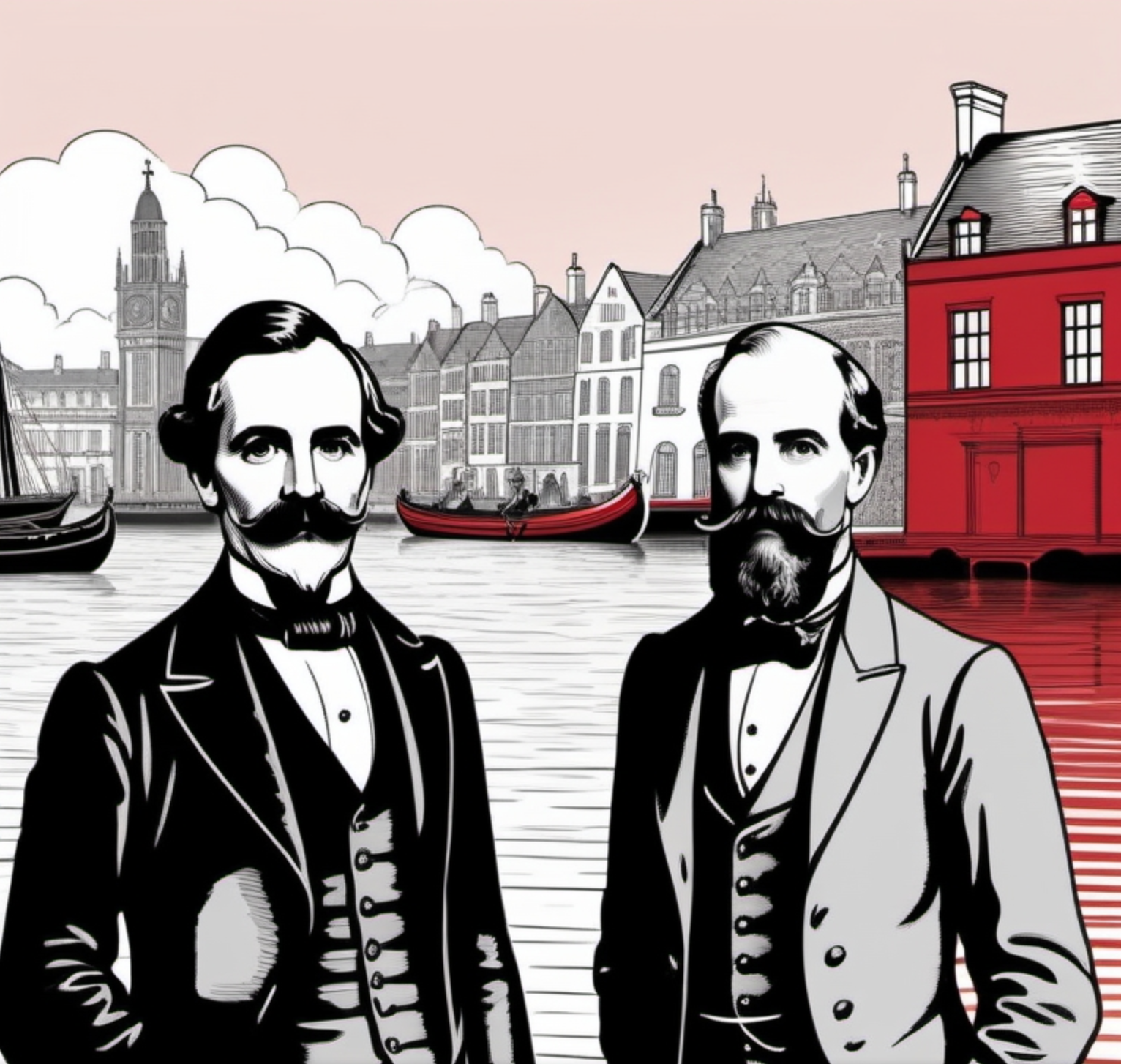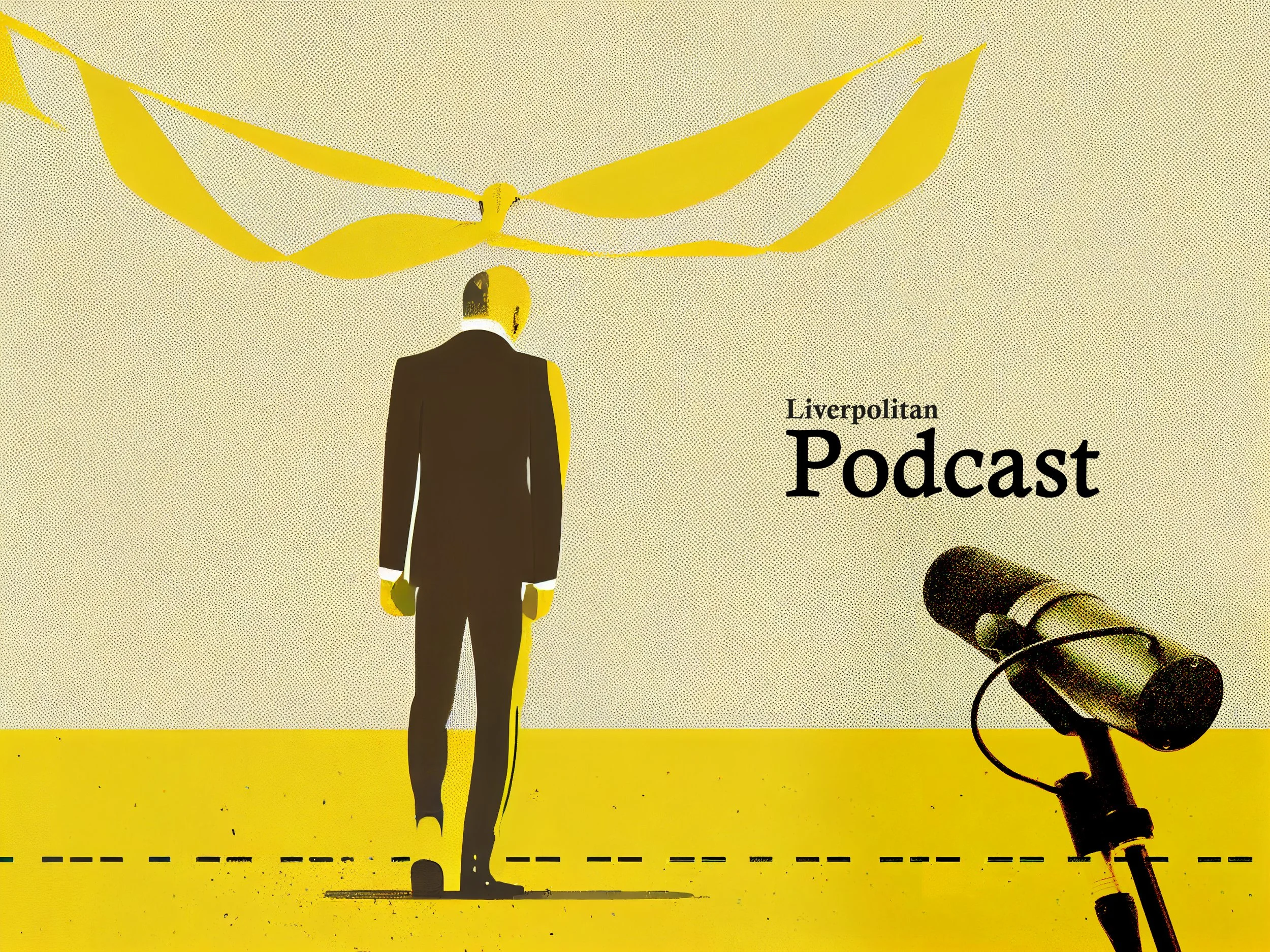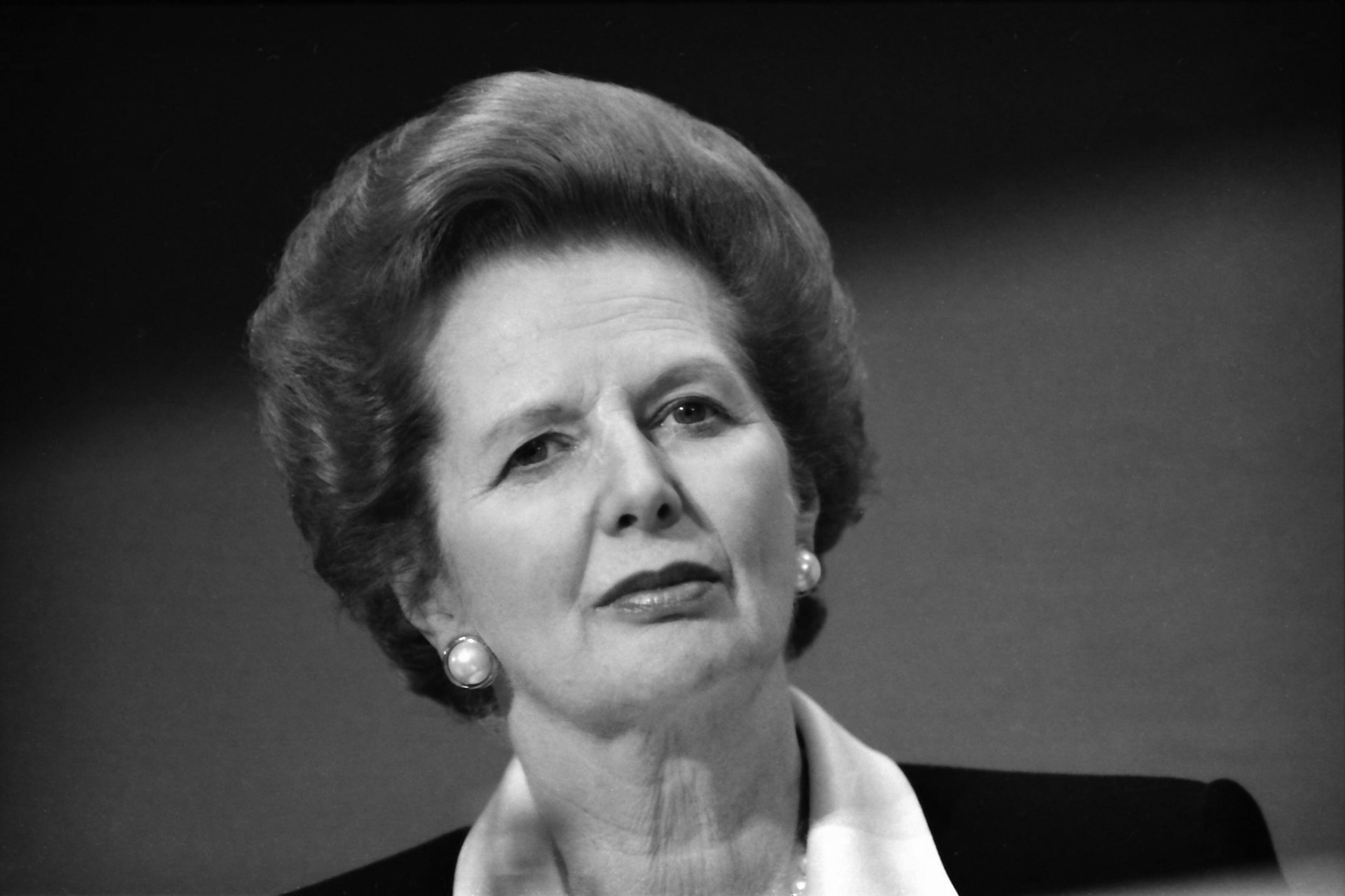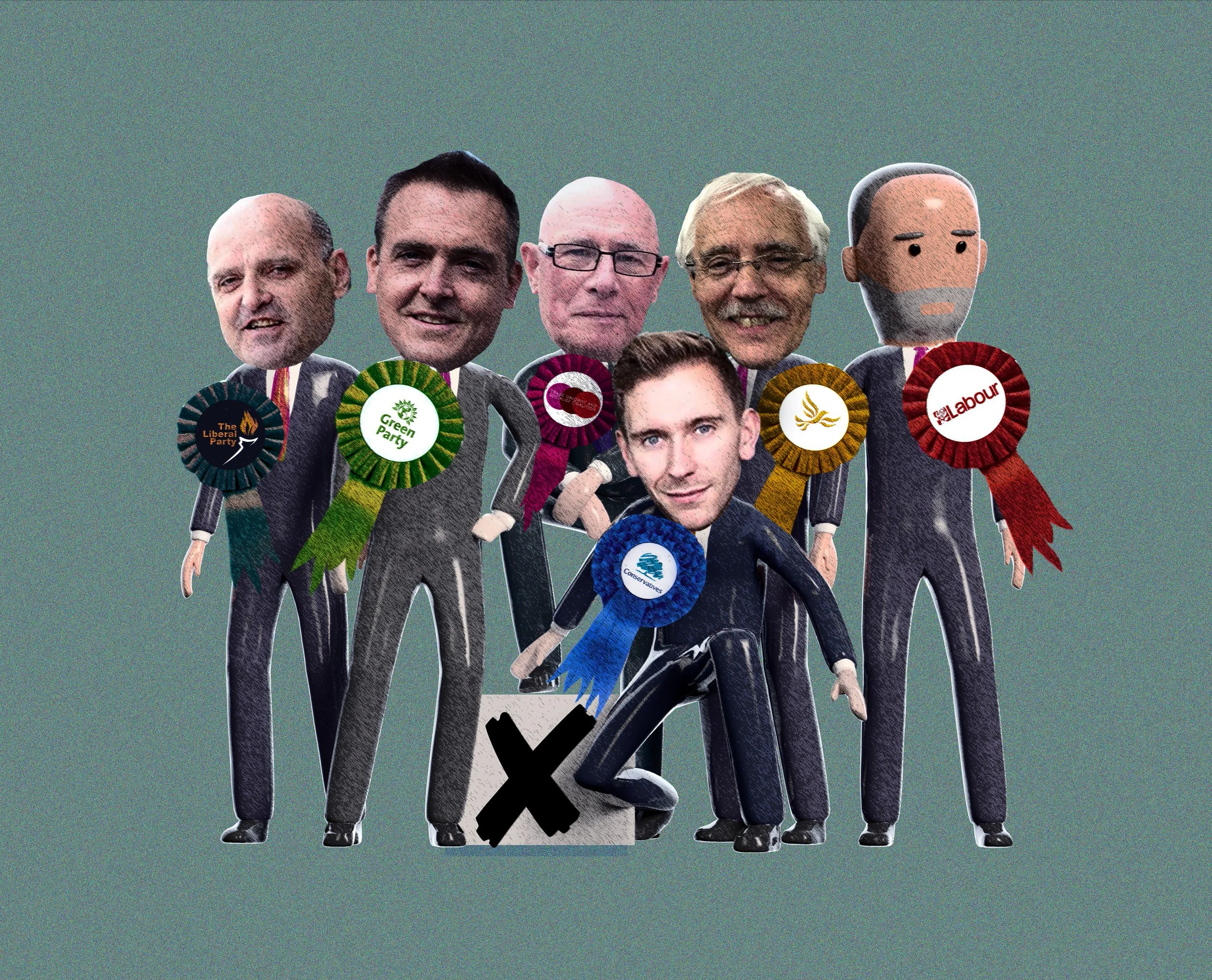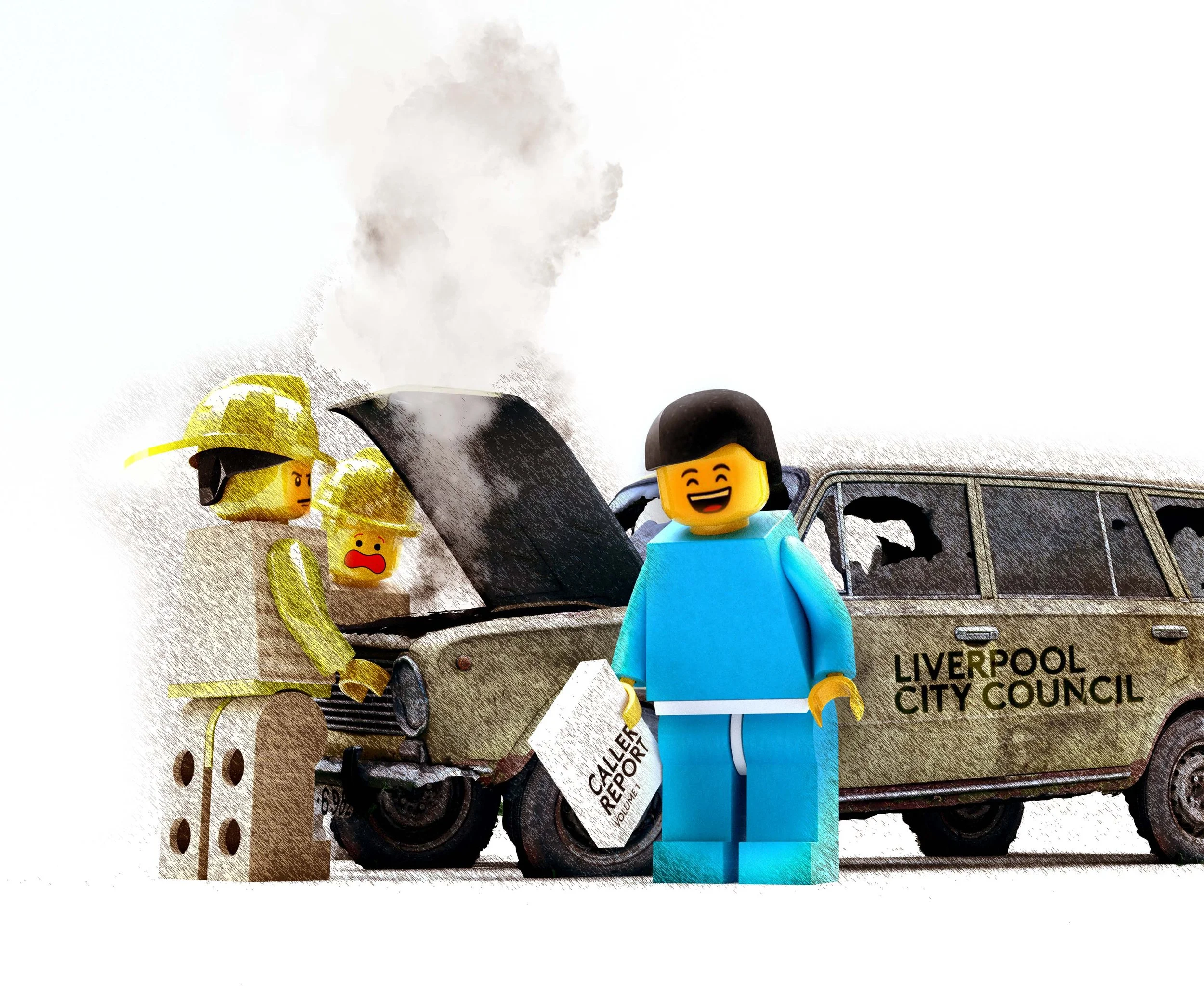Recent features
Pact! What Pact? An Insider’s View on the Lost Battle to Defeat Labour
In the run-up to the 2023 Local Elections in Liverpool, three men working in the shadows, tried to corral the opposition parties into a pact capable of doing some serious damage to Labour at the polls. But in the face of factional intransigence, personality clashes and party ambitions it was doomed to failure. This is the inside story of that failed mission told by one of those men.
Jon Egan
In the run-up to the 2023 Local Elections in Liverpool, three men working in the shadows, tried to corral the opposition parties into a pact capable of doing some serious damage to Labour at the polls. Described as an exercise in herding cats, the enterprise was ultimately doomed to failure, as factional intransigience, personality clashes and party ambitions took hold, before the electorate then delivered the killing blow. This is the inside story of that failed mission told by one of those men, political consultant, Jon Egan.
“Why are we doing this?” is a question that former BBC Radio Merseyside broadcaster, Liam Fogarty and I have been asking ourselves on and off for more than twenty years.
Even before our involvement in the now largely forgotten Liverpool Democracy Commission, we have been kept up at night wondering how to fix Liverpool's broken civic democracy. Years pumped into a losing battle, the odds very much against us. Have we been wasting our time?
The context for the latest phase of anguished introspection was this year’s local elections in Liverpool which, as you may have noticed, returned Labour to power with an increased majority on the City Council. Before explaining the efforts that Liam, myself and Stephen Yip, a former City Mayor candidate and founder of the charity, KIND, made to avert this seemingly predestined eventuality, it’s worth taking the time to fully comprehend and meditate upon the extraordinary fact of Labour’s victory.
There is no simple or rational explanation for Labour’s achievement, although the campaigning skills of my former Labour Party colleague and strategist, Sheila Murphy need to be duly recognised. The Labour campaign was a brilliantly executed masterclass in misdirection, diversion and manipulation worthy of the illusionist, Derren Brown - wiping the collective memory of the city’s voters and convincing them that their party bore absolutely no responsibility for the endemic chaos, waste, corruption and ineptitude of the last ten years. This election, apparently, had little to do with how a struggling city, effectively governed by colonial administrators, was going to put its house in order. No, it turns out the script was the old familiar one about sending a message to the city's historic arch-nemesis - The Tories.
The result, I suppose, proves precisely how difficult it is for people to overcome addictive and self-harmful habits like voting Labour in Liverpool. Maybe what the city needs is not so much new councillors, but counselling.
‘The Labour campaign was a brilliantly executed masterclass in misdirection, diversion and manipulation worthy of the illusionist, Derren Brown.’
In The Myth of Sisyphus, the writer Albert Camus defined the absurd as the irreconcilable gulf that separates human aspirations from the world’s predisposition to thwart them. The tragic image of Sisyphus struggling to roll his enormous boulder to the top of the hill, already sensing the futility of his labours against the forces of gravity, is an apt metaphor for the investment in time that Liam and myself have made in initiatives, campaigns and conversations undertaken over many years in the hope of making Liverpool’s politics function normally. So if the narrative of this election campaign carries the darkly comic resonances of dramatists, Beckett and Ionesco, and their Theatre of the Absurd, then this is not literary pastiche, but rather the perfect paradigm for Liverpool politics. And in that spirit, it seems appropriate to start not at the beginning, but at the end.
One of the most inexplicable aspects of the election result, was the way that the defeated parties far from despairing at the loss of an historic opportunity, were to varying degrees seemingly satisfied (or at worst only mildly disappointed) with their less than modest achievements. For the Liverpool Community Independents getting only three of their cohort re-elected was at least ‘a springboard’ from which to progress. For Green Party Leader, Tom Crone, “bitter disappointment” extended only as far as lamenting the loss of one target ward (Festival Gardens) by a single vote.
For Richard Kemp, the eminence grise of Liverpool Liberal Democracy, the pitiful addition of three councillors, would give his party “plenty of time for reflection on how the council should work, and where the city should be going.” One wonders how after four decades as a City Councillor, Richard was still trying to figure out these rather elementary conundrums, before he finally decided to fall on his sword and announce his long anticipated retirement as party leader.
So let’s rewind to the beginning, or at least the beginning of Act 2. Act 1 being the heroic, but ultimately doomed campaign by Stephen Yip, to be elected as City Mayor in 2021.
Running a surprisingly close and creditable second to Labour’s Joanne Anderson , Yip’s undoing was the stubborn refusal of Green Party Leader, Tom Crone and the ubiquitous Kemp to stand aside to allow for the possibility of deliverance from a disgraced and discredited Labour administration. The 2021 election seemed, at the time, to be a decisive “never again” moment, with penitential expressions of regret from Liberal Democrats and Greens and pledges to learn the lesson of fractured opposition.
Like trying to roll a rock up a hill. Now more than ever, Liverpool’s opposition parties needed to master the alien vernacular of co-operation.
So to Act 2
Following the publication of the Caller Report in 2021 it was decreed that Liverpool should abandon the baroque and inscrutable election-by-thirds system, and instead adopt an all-out election on new boundaries with the majority of councillors to be elected from single member wards. Now more than ever, Liverpool’s opposition parties needed to master the alien vernacular of co-operation. Seemingly unable to conduct conversations between themselves, the task of scoping the opportunities for an electoral pact fell to myself, Stephen Yip and Liam Fogarty. Having manoeuvred the boulder to within inches (well maybe a couple of hundred metres) of the summit in 2021, we felt that one more effort was something we owed both to ourselves and the people of Liverpool. Far from delivering the new dispensation promised following her election, the era of Anderson 2.0 (Joanne) was notable mainly for its dismal continuity - a botched energy contract costing the city millions, hundreds of millions more written off in uncollected tax and rates, revelations concerning councillors dodging parking fines and extended roles for Government Commissioners taking responsibility for even more substandard and failing services.
The process of encouraging political and electoral co-operation between Liverpool’s opposition factions began with a discrete gathering at Richard Kemp’s house in the summer of last year. Treated to copious quantities of sausages and dips, a generally constructive exchange with Richard and his Lib Dem colleague, Kris Brown, concluded with a suggestion that Liam attend their upcoming policy conference to raise a few issues and provide an outsider perspective on the challenges of the upcoming election. Both from this gathering and the subsequent conference, we sensed a distinct lack of enthusiasm for the idea of any form of electoral pact. If this was to happen, pressure rather than polite persuasion might need to be applied.
By the end of the year, we had started informal conversations with friends and contacts within the other three opposition groups - The Liberal Party (an eccentric relic from the pre-Alliance / Lib Dem era sustained in Liverpool through the hyperactive exertions of its charismatic talisman, Cllr Steve Radford), the Liverpool Community Independents (a party formed by dissenting former Labour councillors primarily disillusioned by cuts and corruption) and the Green Party. With the prospect of another squandered opportunity on the horizon, we resolved to take the decisive step of inviting the leaders to a more formal gathering hosted by Stephen Yip at the HQ of his charity, KIND. The tactical approach was to corral the three most willing participants into an agreement and then publicly challenge or shame the Liberal Democrats to come on board.
‘It began with a discrete gathering at Richard Kemp’s house in the summer of last year, where we were treated to copious quantities of sausages and dips.’
Eschewing sausages for club biscuits (salted caramel flavour), the more business-like ambience of the gathering cut straight to the quick. Without an agreement from opposition parties (all of whom occupied terrain to the left of the centre) we would be facing the prospect of another four years of Labour misrule. Apart from pointing out the mutual benefits of a pact, we offered to provide whatever practical, organisational and campaigning resources we could muster from the networks created during Stephen Yip’s mayoral campaign. Admittedly, these were no match for the Labour legions, but we believed they could help the disparate groups to sharpen core messages, target more efficiently and raise the quality and potency of communication collateral. These resources were conditional on the reality of a pact and a clear indication that its participants were putting city before party.
From the outset the Liberals and Community Independents were fully and unequivocally committed to the principle and practicalities of a pact. For Tom Crone and the Green Party, the proposition was clearly more problematic. Promising to take the idea away for "consideration", we were left with an uneasy sense that history was repeating itself. It was unclear at the time, and indeed still is, by what means of mysterious convocation, the Liverpool Green Party reaches its decisions. With Tom intimating that the national party was instructing them to field the maximum possible number of candidates, the sad implication was that regime change in Liverpool was less of a priority than adhering to the diktat from on high. After several days of radio silence, I was tipped off that Tom would be attending a film event at St Michael's church, and it might be a useful opportunity to see how things were progressing. Our conversation, sadly, revealed that they weren't, and that even a three party pact was becoming an unlikely, if not entirely illusory, possibility.
Stephen Yip's description of our undertaking as an exercise in herding cats was suddenly complicated by the unexpected arrival of a much more exotic species defying all known zoological and political categorisations. The first in a series of audiences with hotelier and property developer, Lawrence Kenwright, took place in late December in the sepulchral gloom of the Alma de Cuba bar, formerly St Peter's church. The bar had been the venue for a series of revivalist-style rallies at which Kenwright had railed against council corruption, presenting himself as the figure-head for a new, popular movement called Liberate Liverpool, that would sweep aside the cliques and cabals that had brought the city to its current parlous state.
‘It was unclear at the time, and indeed still is, by what means of mysterious convocation, the Liverpool Green Party reaches its decisions.’
I was deputed to conduct the initial conversation, that provided a fascinating insight into Kenwright's character and motivation, the history of his relationship with the City Council and Mayor Joe Anderson, and the ambitions underpinning his political project. Kenwright's almost visceral determination to unseat Labour was evident; what was less clear was his precise role in the project, and the means and method by which it was to be achieved.
Whilst it was easy to understand the motivations behind Liberate Liverpool, and its attraction as an antidote to an out of touch and self-serving politics, it was difficult to believe that it offered any kind of remedy. Symptoms are not cures, and Liberate Liverpool’s attraction for cranks, conspiracists and far-right interlopers was perhaps an inevitable consequence of its febrile genesis and almost millenarian rhetoric. Some good and sincere people answered the call only to be sent into battle with the campaigning equivalent of peashooters and water pistols. At a subsequent meeting (accompanied this time by Liam Fogarty and ex-Labour Councillor Maria Toolan), we embarked on what we thought was a subtle policy of dissuasion, politely pointing out the inherent flaws of a campaign targeting "people who don't vote" and relying almost exclusively on social media, only to be accused by a Kenwright acolyte of "disrespecting Lawrence."
Our approaches were an attempt to scope the albeit remote possibility of identifying suitably vetted independent candidates who could be assumed into a broader-based Clean-Up Coalition. It is an indicator of our desperation that this hope was ever entertained.
‘We embarked on a subtle policy of dissuasion, politely pointing out the inherent flaws of a campaign targeting "people who don't vote" only to be accused by a Kenwright acolyte of "disrespecting Lawrence."'
As February rolled into March, our efforts became simultaneously more modest and more desperate. Following advice from a sympathetic insider, we were advised to bypass Kemp and re-pitch the idea of an electoral pact to the Lib Dems through the party's former leader and campaign supremo, Lord Mike Storey, who we later discovered was to stand as a candidate in Childwall. Alas Stephen Yip’s conversation with Storey was even more emphatically negative than the sausage-gate soiree with Kemp months earlier.
It was clear we needed to explore more pragmatic alternatives. If not a city-wide pact, perhaps a nod and a wink understanding to avoid actively campaigning in each other's target seats? Maybe also an agreement around some core commitments to improve transparency and accountability, combat corruption and restore public confidence in the City Council? Initially, Richard Kemp sounded refreshingly and surprisingly up for it, but with the fatal complication that some of their target seats were also target seats for the Greens and the Liberals. Nods and winks would have to be restricted to the safest Labour seats in Liverpool where none of the opposition parties entertained serious hopes of winning. In other words, for show only. Meanwhile, Stephen Yip drafted four pledges on transparency and corruption, which were immediately endorsed by the Community Independents and the Liberal Party. The Lib Dems, however, would not sign up; the response published on the But What Does Richard Kemp Think? blog, a depressingly patronising and public epistle "explaining" that the proposals were either illegal, already in place (due largely to his efforts) or would be a waste of money. It seemed futile to point out to Kemp that the proposal for an Independently-chaired Standards Board was not only perfectly lawful, but had been initially drafted for Stephen's Yip’s 2021 manifesto by Howard Winik, who was now a Liberal Democrat candidate.
Unlike his predecessor, does the Lib Dem’s new leader, Carl Cashman have the imagination or inclination to detach his party from its comfortable civic niche in South Liverpool suburbia?
For me, this was perhaps the final and conclusive evidence that laid bare the true nature of Liverpool Liberal Democrats and their deep complicity in a council whose corrupting and dysfunctional culture long predates the shortcomings of the Joe Anderson era. They are not, in my view, an "Opposition Party" in any meaningful sense of the word, but are more akin to the tame collaborators in the sham democracies of the Soviet Bloc - the Liverpool equivalent of the Democratic Farmers Party of East Germany. They have no desire to fundamentally reform or reset a moribund civic culture, but are content to bide their time in the hope that circumstances will grant them an opportunity to preside over its decrepit edifice. In one sense, Liberate Liverpool were right; the Liberal Democrats are not part of a solution, but are an intrinsic and intractable part of the problem. Whether Kemp’s much younger successor, the neophyte Carl Cashman, has the imagination or inclination to detach his party from its comfortable civic niche and the bucolic pastures of South Liverpool suburbia, will largely determine whether Liverpool's local democracy remains a hollow charade, or becomes an empowering mechanism for change.
‘The Lib Dems are not an "Opposition Party" in any meaningful sense of the word, but are more akin to the tame collaborators in the sham democracies of the Soviet Bloc - the Liverpool equivalent of the Democratic Farmers Party of East Germany.’
Epilogue
It is the tragic-comic circularity of the narrative that makes Liverpool politics an absurdist drama. The interminable wait for Godot - an intervention, a new structure, a new political alignment, a salvific figure able to break the cycle of failure, corruption and chaos that has blighted our city for as long as anyone can remember.
On the day of polling, I was helping Maria Toolan with some last minute door knocking to encourage supporters to get out and vote in the City Centre North ward. She was already sensing with fatalist resignation, that her efforts to unseat two former Labour colleagues had failed. "The problem is," she lamented "people aren't bothered about waste and corruption, it's what they expect from the city council and they don't believe that it's ever going to change."
This is the suffocating dead weight of Liverpool politics, an oppressive inertia and sense of fatalism engendered by decades of broken promises, betrayed trust and shameful failure. It's the gravitational drag that immobilises progress and snuffs out any glimmer of a more honest and hopeful politics.
Labour's strategy understands and exploits this endemic cynicism. It doesn't really matter how badly we've governed Liverpool, this is a Labour city and elections cannot alter this brute existential reality. Sending a message to the Tories might actually seem like a more worthwhile place to put an ‘X’ than investing in a hope for something better, when you suspect that this isn't even a logical possibility. Little wonder that 8 out of 10 Liverpool voters decided to stay at home.
Would an electoral pact have unseated Labour? Would it have signalled to voters that there was a tangible possibility of an alternative administration? It's hard to say, but looking at the results and totting up the number of seats where competing opposition parties on the progressive wing of politics won more votes than the Labour majority, it cannot be completely discounted.
Labour mis-fire. By personalising the campaign against Gorst, they had also localised it. In Garston, the election was no longer a rehearsal for a General Election. It was about the honesty and integrity of individuals and their credentials to represent their community - weak territory for Labour to fight on. Photo from Twitter @Pablo8485
If there is cause for hope, it was in the response to what was one of the most deplorable manifestations of Liverpool Labour's darker instincts. The officially sanctioned Labour campaign, scripted from on-high and professionally disseminated under the supervision of Sheila Murphy and their Regional Office, was a vacuous mash-up of kick-the-Tories and Eurovision-phoria. But beneath the sanitised veneer another more vicious and toxic campaign was being waged against Community Independent candidates who had originally been elected under Labour colours. Fake social media accounts became platforms to abuse, ridicule and defame the Community Independents with particular venom aimed at Sam Gorst, a former Labour Councillor seeking re-election in Garston.
The ferocity of the campaign against Gorst reached its nadir with a shamefully deceptive leaflet masquerading as a community newsletter which raked up Gorst's old social media posts, and more seriously, falsely implied that he had used his position as a councillor to jump the social housing queue. Within an hour of the leaflet being issued, we launched our final, and perhaps only effective contribution to the election campaign. A round-robin email was despatched to secure the support of the city's four opposition leaders in a joint denunciation of Labour's malicious and dishonest leaflet. And to their credit, Kemp, Radford, Crone and the Community Independent's Leader, Alan Gibbons all replied with personalised quotes for a media release within 30 minutes. The unprecedented show of unity secured positive media coverage, that was followed by The Echo's political correspondent, Liam Thorp exposing the tell-tale fingerprints of Labour on the scurrilous social media accounts.
An otherwise faultless Labour campaign had slipped up. By personalising the campaign against Gorst and his running mate Lucy Williams, they had also localised it. This election and the campaign against Alan Gibbons in Orrell Park, were no longer just dummy run rehearsals for a General Election or a vote of thanks for delivering Eurovision; they were about the honesty and integrity of individuals and their credentials to represent their community. Gorst, Williams and Gibbons' victories may or may not be a platform for the future growth of the Liverpool Community Independents Party, but they are perhaps a hopeful intimation that gravity doesn't always win.
Jon Egan is a former electoral strategist for the Labour Party and has worked as a public affairs and policy consultant in Liverpool for over 30 years. He helped design the communication strategy for Liverpool’s Capital of Culture bid and advised the city on its post-2008 marketing strategy. He is an associate researcher with think tank, ResPublica.
Share this article
What do you think? Let us know.
Write a letter for our Short Reads section, join the debate via Twitter or Facebook or just drop us a line at team@liverpolitan.co.uk
Child Labour
The latest local election results confirmed an ongoing trend – Liverpool’s councillors are being recruited at an ever younger age. But with low turnouts and widespread voter apathy, what does the emergence of ever more fresh-faced political candidates say about the health of Liverpool’s political culture? And should experience and proven competence trump youthful enthusiasm?
Michael McDonough and Paul Bryan
The latest local election results have confirmed an ongoing trend - Liverpool councillors (especially Labour ones) are being recruited at an ever younger age.
Sam East (Warbreck) and Ellie Byrne (Everton) both in their early twenties, join the likes of Harry Doyle (Knotty Ash), Frazer Lake (Fazakerley) and Sarah Doyle (Riverside) who became councillors at ages 22, 23, and 24 respectively (give or take the odd month – feel free to correct us). The latter three are now all serving in senior positions as part of the Mayor’s Cabinet.
Labour are not the only ones playing to this trend though. On the Wirral, Jake Booth, 19, took a seat last year for the Conservatives while in Liverpool the Tories recently appointed the frankly mature in comparison, Dr David Jeffery as their Chairman at the ripe old age of 27 (though he’s not a councillor).
The emergence of ever more fresh-faced local political candidates, which is often presented as energising and key to connecting with the city’s younger generation is nevertheless curious. Traditionally, solid life experience and proven competence in some other field of endeavour have been seen as valuable traits essential to making a decent fist of a job in public office. Demonstrable skills and previous success, which take time to accrue, have acted as a semi-reliable predictor that a candidate will land on their feet. But that kind of thinking is out of fashion. A fresh, young face is the recipe de jour.
Except it doesn’t seem to be working. The turnouts in the latest by-elections were abysmal- the puny 17% turnout in Warbreck putting the even more atrocious 14% in Everton to shame. Perhaps this should be a lesson that viewing politics though the lens of identity resonates far less than actually being credible.
None of this is to suggest that young people shouldn’t be in politics - far from it! And you could argue the older generation haven’t exactly pulled up any trees. Age and ability are not guaranteed bedfellows and we’ve all met unwise old-hands who are best left in the stable. But surely, even amongst the parroted outcries of ageism, track record counts for something?
The comments in the Liverpool Echo were a peach. “Shouldn’t those two be in school?” said one. “What life experiences can they bring to their roles. Jesus Christ!” said another. L3EFC expressed some doubt that “People fresh out of Uni” would be able to “stand up to the people who grease the wheels in this town.”
Which means we have to ask the question… can it be right that such inexperienced councillors are representing these deeply challenged areas which are crying out for leadership that can deliver on the ground? Will Councillor Ellie Byrne, the daughter of a sitting MP, deliver the kind of positive change Everton desperately needs? Does Councillor Sam East have the real-world nous to effectively tackle the issues holding back Warbreck? Or are these two eager and no doubt able politicians the product of a disinterested local Labour machine that doesn’t care or need to care about who it puts forward for election?
“The comments in the Liverpool Echo were a peach. ‘Shouldn’t those two be in school?’ said one. ‘What life experiences can they bring to their roles? Jesus Christ!’ said another.”
Of course, there are several reasons why young candidates are so attractive to party leadership. On the upside, they offer the classic and generally much needed injection of new blood. They hold out the potential for new ideas and new energy. And in Liverpool, where there is a dark shadow over much that has gone before, you can understand the desire to clear the decks and start afresh. But there’s another darker reason. Young councillors are pliable. They’re more likely to do what they’re told. While they’re still building their confidence, they won’t challenge the top dogs and that’s useful when your grip on power is weak. Mayor Joanne Anderson, herself relatively inexperienced as a councillor, has introduced young members to her Cabinet with responsibility for key portfolios including Development and Economy, Adult and Social Care, and Culture and Tourism. Without casting any aspersions on Cabinet members talents or potential, you can see their appeal.
We have to ask where the Liberal Democrats, Liberals, Conservatives and Greens are in all of this? Despite making admirable gains in many wards they still haven’t made much of a dent in the city’s ‘red rosette’ Labour strongholds and this despite the Caller Report offering them ammunition on a platter. As strong a campaign as the Green Party’s Kevin Robinson-Hale ran in Everton (albeit clearly under-resourced) he still only polled 362 votes. In Warbreck, the Lib Dems Karen Afford polled 874. This is not what engagement looks like. Perhaps it’s time all parties in the city took a long hard look at who they’re putting forward for local elections, what pledges are being made and why for the moment so many amongst the electorate simply couldn’t give a toss about what their local political parties have to say.
Ellie Byrne’s vacuous election promises were a case in point and a classic example of how an unengaged electorate enable party cynicism. Why bother getting too specific or measurable with your commitments when no-one is asking for it might be the rejoinder of the spin doctors, but it feeds the descent into low participation. A deeper critique suggests a more existential worry – our parties just don’t have any answers, scraping around in the bargain bin of ideas, and plucking out little more than platitudes of intention. Heaven forbid someone might actually come up with a plan to drive more employment.
It must be said in Liverpool the wheels turn more slowly. Many voters’ unflinching loyalty to party blinds them to individual failures, provoking little more than a shrug of resignation. Or worse, it depresses their sense of the possible. And that’s deadly, because if you don’t believe you can do much in life, the world has a tendency to deliver on your expectations.
But you can only hoodwink the voters for so long. When it comes to delivering results in the four years of office a councillor receives, competence beats willing nine times out of ten. A fresh face may serve you well enough amongst the cheap thrills of an election campaign, but does it really get the job done? Eventually, without the ideas or the know-how to deliver on them, you’ll get found out.
There is the temptation in Liverpool to think that little changes in the political sphere. That despite the odd bit of noise within the ruling party, on the outside all is stable and unchanging. A recent electoral modelling exercise suggested the upcoming 2023 boundary changes in electoral wards would have only the most superficial of effects. Labour, instead of holding 78% of council seats would now hold 79% it predicted. So much for turbulent times.
But bubbling away under the surface, something is happening and the results will be unpredictable. The recent by-elections were a warning, not just to Labour but to all parties. Sooner or later, voters will do what voters do. They don’t like being taken for granted.
All of this opens up a wider question about the city and its communities. Why are there so few people from a more professional background standing for election? What exactly is turning them off? Many of these people will be successful in their own lives. Could there be some really strong politicians and visionaries amongst the roughly 70% who don’t vote in local elections? Are there talented leaders amongst those Liverpolitans who look on at an unwelcoming, opaque and sewn-up political culture with distaste and disengagement?
Decades of brain-drain have undoubtedly had an impact. Liverpool has jettisoned so much of its professional class who left in search of opportunity they could not find at home. And now the parties are trying to fill the void by turning to ever younger graduates. If the trend continues we may well see in the coming years candidates organising their election campaigns around their GCSE examination calendar. An 18-year old Jake Morrison, who triumphed in 2011 over former Council Leader, Mike Storey to win the Wavertree seat may have well been a harbinger of times to come. He retired from politics aged 22.
Of course, at Liverpolitan, we always wish newly elected councillors well and hope to be pleasantly surprised by the new additions but we’d argue their election success is symptomatic of a much bigger elephant in the room, a room that clearly has fewer and fewer adults. It is a room dominated by established party complacency and a dash of arrogance; a city electorate detached from politics and a political culture devoid of real local talent and energy putting itself forward.
Michael McDonough is the Art Director and Co-Founder of Liverpolitan. He is also a lead creative specialising in 3D and animation, film and conceptual spatial design.
Paul Bryan is the Editor and Co-Founder of Liverpolitan. He is also a freelance content writer, script editor, communications strategist and creative coach
Share this article
What do you think? Let us know.
Write a letter for our Short Reads section, join the debate via Twitter or Facebook or just drop us a line at team@liverpolitan.co.uk
How should we be governed? Six parties have their say…
The Council’s public consultation on future governance models for Liverpool is now open and at Liverpolitan we think you should get involved. But what’s the position of the parties? We asked six of them – Labour, Liberal Democrats, The Green Party, The Conservatives, The Liberal Party and the Trade Unionist and Socialist Coalition (TUSC) to write up to 400 words stating which of the three governance models they favour and why.
Liverpolitan
Well, we might not have got the referendum we wanted but the people of Liverpool still have a chance to have their say on how the city is run. The Council’s public consultation on future governance models is now open and at Liverpolitan we think you should get involved.
Healthy democracies require participation and in a city that often sets a high bar on shenanigans, figuring out how to keep our representatives and over-lords in check and on-track seems like a worthwhile way to spend our spring evenings.
So what do you need to do?
Visit https://liverpoolourwayforward.com
Read about the three options on the table, weigh up the pros and cons, talk to your friends and family, have a row about it, and complete the online survey by no later than the 20th June 2022.
The three options presented are:
1) The Mayor and Cabinet model – what we have now
2) The Leader and Cabinet model – what we had previously
3) The Committee model – what we had before the year 2000
Once the results of the consultation are in it’s then up to our councillors to decide how or indeed whether to implement the results. That may leave wiggle-room for all kinds of disagreements but there’s a strong suggestion that parties will attempt to honour the outcome. Any changes that take place will be implemented from the 4th May 2023 at the local elections.
But which models do each of the parties support?
We asked six local political parties – Labour, Liberal Democrats, The Green Party, The Conservatives, The Liberal Party and the Trade Unionist and Socialist Coalition (TUSC) to write up to 400 words stating which of the three governance models they favour and why. Each party either has local councillors in Liverpool now or in the case of the Conservatives and TUSC regularly field candidates in local elections.
Here’s what they had to say.
The Labour Party position
We approached Major Joanne Anderson for comment but did not receive a reply, although in a previous interview on BBC Radio Merseyside she said “I want to say neutral." However, an official party spokesperson gave us this statement:
by a Liverpool Party spokesperson
“The city wide consultation is now open and the Labour Party is committed to listening to what the residents of Liverpool have to say about how the City Council is run. It is important that no political party pre-judges the outcome of the consultation and that residents feel that that their voices are being heard. Based on the results of the consultation, the Labour Party will then take a formal position on the governance of our city.”
Model favoured: Undecided
Liverpolitan says: Labour’s position is not to have a position until the results of the consultation are in. They will then decide on their favoured model ‘based on the results’.
The Liberal Democrat position
by Councillor Richard Kemp, Leader, Liverpool Liberal Democrats
The ‘committee system’ is the Lib Dem choice for Liverpool’s governance
“There are three choices allowed in law by which the council can govern itself although some modifications can be made to the Leader and Committee models.
“I am working on the assumption that few in Liverpool would be mad enough to vote to keep the Mayoral system as it has been so badly devalued by Joe Anderson.
“The Leader and Cabinet model has many of the bad mechanisms that are contained in the Mayoral model. Much has been made of the fact that this is the model that the Lib Dems introduced in 2000 but we had little choice because the only two options that were available to us were the Mayoral or Leader models. Both of them concentrate power in the hands of a few people and do so in a way which encourages secrecy and makes it very difficult to challenge what the Cabinet wants to do. The Leader model was the least bad option!
“Since 2012, a third way has been available which is called the Committee system. This means that decisions are taken not by a one-party cabinet but by a number of committees which are representative of the political make-up of the council. That means that:
1. Decisions can be challenged at the time they are made by members of both the biggest party and the other parties on the council.
2. All councillors will be involved in decision making which means that they will know more about what is going on and have to account for the decisions that they make to the people.
3. The people of Liverpool will be more involved as well because there are far more people that they can ‘nobble’ about these decisions.
4. The system is much more accountable and transparent with far fewer decisions being made in the dark recesses of the council.
“We believe that this is the best way forward and will campaign for it in the coming months. However, there is no point in consulting with the people of Liverpool unless we are prepared to debate the issues with them and take heed of what they have to say. We hope that a clear expression of what people want will come out of the consultation. We will then support the people’s views and I challenge the other parties to do exactly the same.”
Model favoured: The Committee system
Liverpolitan says: The Lib Dem’s position is clear – they will be campaigning in favour of a Committee structure of governance but promise to abide by the results of the consultation.
The Green Party position
by Councillor Tom Crone, Leader, Liverpool Green Party
Democratic decision-making for a cooperative political culture
“We are very critical of this consultation. Once again, the people of Liverpool are being denied a proper say on how we are governed. In 2012, while voters in cities across the country were asked if they wanted an elected mayor, Liverpool Labour decided they knew best and imposed the mayoral model. The result was a decade of chaotic mismanagement. Now the city council is having to work round the clock trying to fix the mess left behind.
“This consultation does not have the same democratic authority as a referendum. Having three options makes a clear, unambiguous decision unlikely. The responses will need interpreting, and that will still leave the final decision with the Labour Party. That has a nasty whiff about it. We would much prefer to trust the people of Liverpool with the final decision.
“The Greens will be making the case for adopting the committee system. The committee system involves many more councillors in decision making and policy development. Under the current system even most Labour councillors have very little to do with real decision making. It is only Cabinet members who have real executive powers. Other democratically elected councillors are simply shut out. Even within the Cabinet, the Mayor sets the agenda and can predetermine outcomes. Power is really concentrated in a very small number of individuals. This leads to poor decision making, not least because it fails to make use of the skills and experiences of all the 90 councillors elected to represent their communities.
“The committee system, as well as sharing out power more fairly, also encourages much more constructive cross party working. The public rightly complains about “yah-boo” politics and it is shocking how often our debates in council chamber descend into pointless political point-scoring because really decisions are taken elsewhere. A committee system means different parties having to sit down together and really decide how best to deliver for the people of Liverpool. Councillors will soon realise that they agree on a lot, while learning to respect distinctive perspectives.
“The imposed Mayoral system opened the door to the shame of the Joe Anderson years, and slammed it shut on transparency and democratic accountability. It’s time to ditch the personality politics and let the people back in.”
Model favoured: The Committee model
Liverpolitan says: The Green Party’s position is clear – they will be ‘making the case’ for a Committee structure of governance.
The Conservative Party position
by Dr David Jeffery, Chairman, Liverpool Conservatives
The voters should decide whether we have a Mayor, not Liverpool Labour
“In 2012, referendums were held across 11 of England’s large cities on whether to introduce directly elected mayors. One city was conspicuous by its absence: Liverpool. Instead, in their infinite wisdom, the Labour-run city council decided to ignore the people and voted to bypass a referendum. They introduced the mayoral position by stealth, and parachuted in Joe Anderson – and we all know how that turned out. Of the three authorities which have adopted and then subsequently abolished the mayoral system, all three have done so following a referendum. If Liverpool Labour get their way, once again one city will be conspicuous by its absence: Liverpool.
“The truth is that this Labour council want to ignore voters. This consultation is a gimmick – the result is a foregone conclusion, likely designed to sooth internal party arguments and resentments that have built up under Joe Anderson. We’re told by Labour that a referendum would be too expensive - never mind the fact that seven Labour councillors rebelled over Labour’s budget, which built up excessive financial reserves – but those more sceptical than I might argue it’s not a surprise that this move came after Labour were forced into a humiliating second round of voting in the 2021 mayoral election.
“Decisions on how our city is run should not be made from on high in Labour Party backrooms. Our executive arrangements should not be a consequence of internal Labour Party management. This city’s government is not their plaything, and to treat it as such is an insult to voters.
“There are good arguments for a Mayor: studies have shown that, compared to a council leader, mayors better represent the whole city, are more outward-looking, and are better at bringing much-needed investment into the city. Mayors are put in office by the people, whilst council leaders are selected in grubby back-room deals within their own party, and as such mayors have a better claim to speak for the city as a whole.
“Indeed, it is arguable that the real issues with Liverpool’s politics isn’t the mayoral system, but the fact that Liverpool Labour allowed Joe Anderson to abolish the mayoral scrutiny committee because he didn’t like the type of scrutiny he was receiving.
“Liverpool Labour should do the right thing and give the people of Liverpool a vote on how they are governed. It really is that simple.”
Model favoured: Undecided
Liverpolitan says: The Conservative Party have yet to take a formal position but do see merits in the Mayoral system. However, they believe that it should be up to the voters, not parties to decide which model to choose through the implementation of a referendum.
The Liberal Party position
by Councillor Steve Radford, Leader, The Liberal Party
Time to wake up. Keep the Mayor, adopt Proportional Representation and ask questions
“In over 40 years in politics I’ve seen corruption and abuse of power in all models of local government in Liverpool.
“In the Militant years I saw the sale of land at knock-down prices, council officers withholding information, dodgy minutes and record keeping and much more that I sadly can’t put into print. And that was under the committee system.
“Key to the abuse of council procedures was a willingness by some to turn a blind eye to those who broke or undermined the rules. Later on, during the Lib Dem years things were little different and legal battles had to be fought just to uphold the basic right of council members to attend certain public meetings. That was under the Leader and Cabinet model.
“One of the reasons I fear abuse of power has gone on for so long in Liverpool is the failure of the police to uphold the law. Today, they are tasked with some very important investigations under Operations Aloft and Sheridan that have been triggered during the years of the Mayor and Cabinet model. We should watch the outcome of those investigations closely.
“So what’s the answer? Firstly, we must get rid of the first past the post voting system than gives an inflated majority to a lead party, creating a vacuum of safe seats where the electorate is totally taken for granted.
“Secondly, we need senior council officers selected on merit, not on how subservient they are to the ruling party. Some have been brave enough to stand up for professional standards. Others have not.
“On to the Mayoralty. Without a doubt, both central government and the business community prefer a Mayor with an agenda focused on the whole city, rather than a Leader who is just accountable to a ward and their own political council group.
“Liverpool is an internationally recognised city and we need a Mayor to put us on a level playing field with our global peers. If Liverpool has in the past elected the wrong mayors that responsibility ultimately lies with the electorate. Being candid, it’s about time residents looked more at the person, and less at the colour of the rosette.
“Some readers may know that I chair the City Region Scrutiny Committee – and from that role I can see how the Metro Mayor, Steve Rotheram quietly secures funds for the region by adopting more mature and less confrontational politics.
“We should have a Mayor but we need a more diverse council elected by proportional representation, and we need a more curious electorate willing to ask difficult questions of the candidates who canvass for their votes.”
Model favoured: Mayor with Cabinet
Liverpolitan says: The Liberal Party position is clear – they support retaining the Mayor with Cabinet structure of governance, but want to see the adoption of city-wide proportional representation for local elections.
The Trade Unionist and Socialist Coalition (TUSC) position
by Roger Bannister, Leader, Liverpool TUSC
Response to Proposals on City Governance
“Three proposals have been put forward on models for council governance in advance of the ending of the term of office for the directly elected Mayor in 2023, which are referred to as The Mayor and Cabinet Model, The Leader and Cabinet Model and the Committee Model. Of these three models, TUSC supports the Committee model.
“TUSC takes this position because it is the Committee Model that gives most powers to the directly elected councillors, rather than concentrating many of them in the hands of one person, as the Mayor and Cabinet Model does, or in the hands of a relatively small number of people as the Leader and Cabinet Model does.
“It is the strong view of TUSC that the electorate is best served when power is more evenly shared amongst councillors, so that by making representation to a Ward Councillor about an issue, that councillor will be able to exert influence effectively on behalf of the people that he/she represents. This is less likely to be the case with the other two models.
“It is our belief that both the Mayor and Cabinet and the Leader and Cabinet models were devised in order to ‘speed up’ the council decision making process, and whilst this is not a bad thing in itself, if it is done at the expense of democratic process, it is potentially prone to corrupt practice. Given the current involvement of the police in the municipal affairs of Liverpool, this point must be taken very seriously indeed.
“It is also our belief that there is a large and growing disconnection from, and cynicism in local politics in Liverpool, which can be expressed quite vehemently when people speak to TUSC candidates and supporters during election periods. The introduction of a directly elected Mayor, not as in most cities following a referendum, but by will of the Council alone, has done little to halt this trend.
“Local government in Liverpool is at a crucial stage, with democracy under attack both from the recommendations of Max Caller, with a reduced number of councillors, and elections only on a four yearly basis. Now is not the time to further reduce democratic accountability as the first two options would do.”
Model favoured: Committee system
Liverpolitan says: The Liverpool Trade Unionist and Socialist Coalition (TUSC) position is clear – they support the Committee structure of governance.
So there you have it. Some for the Committee system, some leaning towards keeping the Mayoral model and some steadfastly neutral or yet to declare. But now it’s over to you. Each model has its advantages and disadvantages. What do you think?



